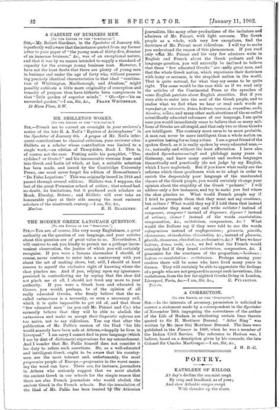THE MODERN GREEK LANGUAGE QUESTION. [To TEE EDITOR OF TEE
" SPECTATOR.".1 SInf"-YOU are, of course, like very many Englishmen, a great authority on the question of our language, and your articles about this question are of great value to us. Nevertheless, I will venture to ask you kindly to permit me a perhaps incon- venient observation, the justice of which you will certainly recognise. If you were a famous shoemaker I should, of course, never venture to enter into a controversy with you about the art of making shoes, but, still, I should at least reserve to myself the exclusive right of knowing where the shoe pinches me. And if you, relying upon my ignorance, persisted in contradicting me by saying that the shoe did not pinch me at all, I should not trust any more to your authority. If you were a Greek born and educated in Greece, you would, perhaps, be of the opinion of all really educated Greeks, who firmly believe that the so- called xagapagivoa is a necessity, or even a necessary evil, which it is quite impossible to get rid of, and that those "few educated men" (as you call Mr. Psicari and Co.) who earnestly believe that they will be able to abolish the sada/4401nm and make us accept their linguistic reforms are too naive, not to say ridiculous. You say that after the publication of Mr. Pallis's version of the Iliad "his life would scarcely have been safe at Athens,—happily he lives in Liverpool." I am sorry I cannot find in your language (which I use by dint of dictionary) expressions for my astonishment. And I wonder that Mr. Pallis himself does not consider it his duty to refute such assertions. He, as a well-educated and intelligent Greek, ought to be aware that his country- men are the most tolerant and, unfortunately, the most progressive people of Europe,—progrcesire in the worst mean- ing the word can have. There are, for instance, journalists in Athens who seriously suggest that we must abolish the ancient Greek in our schools for the simple reason that there are also French journalists who would abolish the ancient Greek in the French schools. But tbe.icanslation of the Iliad of Mr. Pallis has been treated bir.lbs'Athenian
journalists, like many other productions of the imitators and admirers of Mr. Psicari, with light sarcasm. The Greek people as a whole, with very few exceptions, find the doctrines of Mr. Psicari most ridiculous. I will try to make you understand the reason of this phenomenon. If you read only what Mr. Psicari and his very few admirers write in English and French about the Greek pedants and the language question, you will naturally be inclined to believe that these " few educated Greeks" are ieally great men, and that the whole Greek nation, which repudiates their doctrines with irony or sarcasm, is the stupidest nation in the world. That is quite natural, for what they say seems to be quite right. The same would be the case with us if we read only the articles of the Continental Press or the speeches of some English patriots about English atrocities. But if you were able to enter into the soul of the Greek people, and to realise what we feel when we hear or read such words as
-s-spcurpeouji, -rsxfas4-4-1, ozims, StiCp-sart, Tptxvp.e a, avypeepiac, eicao, Aiaxi4.oc, sgoxo, and many other such abortions of the so-called scientifically educated reformers of our language, I am quite
sure you would immediately cease to believe that so many mil.
lions of Greeks are all stupid, and that only two or three Greeks are intelligent. The contrary must seem to be more probable.
A man can never be more intelligent than a whole nation on a question lasting for so long a time. I am a great friend of the spoken Greek, as it is really spoken by every educated man,-- i.e., naturally and without the least affectation. I have also studied Sprachwissenschaft and philology many years in Germany, and know many ancient and modern languages
theoretically and practically (do not judge by my English, which I have neglected). But if you knew what really are the reforms which these gentlemen wish us to adopt in order to enrich the desperately poor language of the uneducated classes of the Greek people, you would certainly change your opinion about the stupidity of the Greek " pedants." I will adduce only a few instances, and try to make you feel where the shoe pinches us. What would French people say if
I tried to persuade them that they must not say constance, but coiltace ? What would they say if I told them. that instead of constater they must say and write coidater ? instead of compenser, compeser ? instead of dispenser, dipeser ? instead of estimer, etimer ? instead of the words constatation, compensation, &e., colitataison, compesaison, &c. ? What
would the Italians say if they were told to use the words
cofiagrazione instead of conflograzione ; pienario, piacido, chiamoroso, chiandestino, chiesiastico, &c., instead of plenario, placido, clamoroso, claralestino, ecclesiastic°, &c. When we hear as react, g-rkan, axt34 x.T.X., we feel what the French would certainly feel if they heard cattataison, compesaison, &c. I guarantee for the exactness of the proportion,—Bashgurcrt; Brerart = constatation : coiitataison. Perhaps among your readers there will be some who have lived many years in Greece. They will certainly be able to appreciate the feelings of a people who are not prepared to accept such inventions, like con' tataison, from the few far-sighted Greeks living in London, Liverpool, Paris, 6:0.-1 am, Sir, &c., C. PYLARINOS. Trieste.






































 Previous page
Previous page